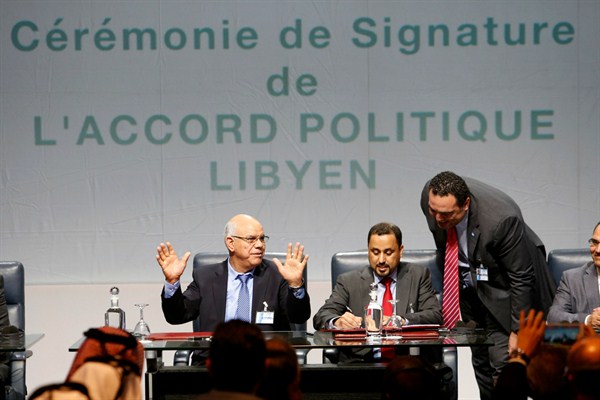On Dec. 17, dozens of delegates from Libya’s two rival parliaments, as well as from local municipalities and civil society, signed a United Nations-brokered deal to form a national unity government and hopefully halt the country’s long descent into unrest and civil war. Talks had been ongoing for almost a year, with plenty of obstacles along the way. But almost a month on, the agreement’s prospects are decidedly mixed.
The nascent Government of National Accord has yet to be fully formed. A nine-member presidential council is up and running, although working mostly from Tunis. Overall, the power-sharing process outlined in the agreement is slightly behind schedule, but this is not necessarily bad. Previous pressure from the international community to stick to a given and often hasty timeline has led to fatal errors in Libya since the fall of Moammar Gadhafi in 2011, such as holding elections in 2014 without a massive registration effort and an agreement between factions to respect the outcome. Reconciliation takes time, and the United States and the European Union—the two main outside forces trying to shepherd it in Libya—will have to be patient and devise interim solutions while the unity government comes together.
After all, the two speakers of the rival parliaments based in Tobruk and Tripoli remain opposed to the agreement. The leader of the House of Representatives in Tobruk, Agila Saleh, has softened his stance after key tribes in eastern Libya backed the deal—albeit under the condition that the role of the Libyan National Army and its leader, Gen. Khalifa Haftar, are preserved. In Tripoli, Nuri Abu Sahmain, the speaker of the Islamist-backed General National Congress, did offer a concession to the new U.N. mediator, Martin Kobler, by agreeing to facilitate moving the U.N. Special Mission for Libya back to the capital. In the last week, several municipalities have also sided with the new national unity government, with Benghazi’s local council even offering to become Libya’s temporary capital, until the government can move back to Tripoli.

